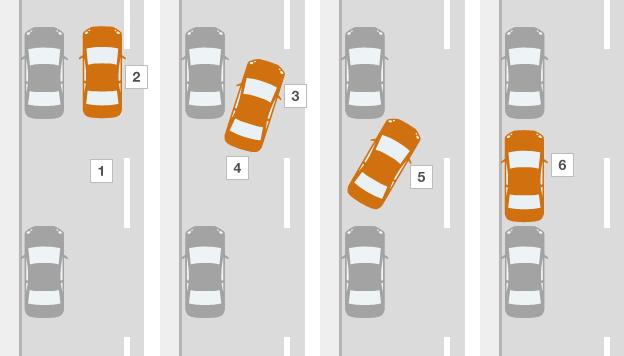Who, what, why: How do you parallel park?
- Published
.jpg)
A video of a driver spending 30 minutes repeatedly failing to reverse into a generous parking space has become an internet hit. But how do you parallel park successfully?
As an instructional video on how not to do something it's masterful.
Over the course of half an hour a hapless but determined driver tries and spectacularly fails to parallel park between two cars a good distance apart.
The duration and infamy of the episode aside, it's an experience that many people can relate to.
Sometimes everything just falls into place - you turn the wheel and the car slips elegantly backwards into a space that barely accommodates its length.
At other times - usually with a queue of traffic building up - a wheel mounts the kerb, a hubcap is scraped, the bumper of a neighbouring car is nudged, or the car is left stranded several feet from the pavement.
The woman took about half an hour to park her car
There are many other failed attempts to complete the manoeuvre on YouTube to underline the fact that this is a common problem.
Among the offerings are a bid to park a Mini in a space simply not mini enough for it, a man using a space so small that he has to turn his wheel a dozen times and jolts the neighbouring cars with every movement, and a car reversing heavily into the one behind it - repeatedly.
So, how are drivers supposed to parallel park?
"We as human beings are not genetically programmed to go backwards, so reversing in general is really quite difficult when you're learning to drive," says Kevin Delaney, head of road safety at the Institute of Advanced Motorists.
"If you're driving forwards you turn the wheel quite a way and you get a gentle turn of the car. Going backwards it doesn't work like that - you get a really sharp turn with little use of the wheel.
"Parallel parking complicates the issue further - you're aiming for a defined space."
So, some pointers are needed to ensure success.
Delaney, who admits that he "still has to concentrate" when parallel parking uses the method below and credits it with getting his daughter through her driving test when she was 18.
It assumes that you are parking on the left, so reverse the turns of the wheel if parking on the right.

The answer: How to parallel park

Pull up alongside the gap you want to park in and check it's big enough - allow a minimum 2ft (60cm) at both ends
Move slowly forwards until the back of your car is alongside the back of the car in front of your space
Turn the steering wheel to the left, just how far will depend on your car
Move slowly backwards - using the rear view mirror to keep an eye on the car behind you and the nearside mirror to check the position of the kerb
When your car is close to the kerb, your car should be clear of the one in front - turn the steering wheel to the right, to bring the front of your car close to the kerb
Straighten up the wheels by turning the steering wheel to the left
Source: Institute of Advanced Motorists

To make this work there are two other things to bear in mind, says Delaney.
One is that you need to feel confident, the other is to accept that you're going to have to keep on practising until you get it right.
The results are mixed.
"There are some people who will not parallel park - they would sooner drive the extra half mile to use the supermarket car park," says Delaney.
"There are other people whose skills leave me gasping with amazement - it just seems absolutely effortless."
And then there are those drivers who are able to leave the whole problem to their cars.
Well aware that there are many motorists who would prefer to never parallel park a number of manufacturers have introduced park assist systems, which allow onboard computers to take charge of the manoeuvre.
"It seems like an extremely good idea to me," says Delaney.
You can follow the Magazine on Twitter, external and on Facebook, external